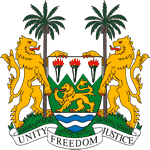 Space
Program of Sierra Leone
Space
Program of Sierra Leone
------The Sierra Leonan Space Agency------
|
|
Level = 0 Development: Very Low
What has been going on in Sierra Leone
What kind of space power do they have?
Does Sierra Leone have space weapons?
What are they planning over there? |
Population: 5,600,000 / Language: English / GDP: $900 / Cities: Freetown
OVERVIEW
Sierra Leone, in West Africa, emerged from a decade of civil war in 2002, with the help of Britain, the former colonial power, and a large United Nations peacekeeping mission. Full name: Republic of Sierra Leone
Ahmad Tejan Kabbah won a five-year term in elections in May 2002, gaining more than 70% of the vote.
|
Sierra Leonan Space Agency Sierra Leone is one of the world's poorest countries, with possibly the least developed space program in the world along with Niger. Not only does it certainly not have an agency, but also no infrastructure in which one would arise. Its only university has no space related educational architecture, lacking astrophysics, astronautics, aeronautics and natural sciences. The government has no ministry devoted to science of this type. Sierra Leone has no history of being part of any organization dealing with space, nor has any launch capability. Sierra Leone lacks the industrial base, the educational base and the political foundation for a process like this to occur within it. It has no functioning university with an astrophysics or astronautics program, and nonexistant industry, despite the Sierra Leonean University being the oldest in West Africa. It operates no satellites and, not having a presence, has no space power. The government of Sierra Leone in Freetown has no plans for attempting to further any ambition in space development or research.
|
None
|
TODAY AND INTO THE FUTURE
Nothing Planned
|